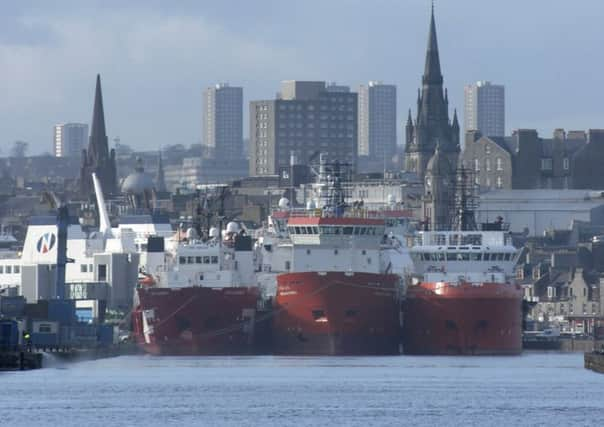Martyn McLaughlin: North Sea should be ashamed of the Malaviya Seven's fate


For an industry that has delivered hundreds of billions of pounds in revenues and is seldom shy in trumpeting how it values the welfare of its workers, the abandonment of the crew of the Malaviya Seven ought to shame the guardians of the North Sea’s riches.
It is approaching a year since the Indian vessel and its workers were detained in Aberdeen after the ship’s owners failed to pay their wages. Stranded some 4,500 miles away from their families and largely confined to their dilapidated ship, they have relied on the benevolence of strangers, unions, and charities.
Advertisement
Hide AdAdvertisement
Hide AdThe men’s purgatory has earned them victimhood status, but only up to a point. Their fate is presented as an unavoidable ripple effect of free market economics. They are extended halfhearted murmurs of sympathy, but at a time of waning fortunes in the oil and gas sector and continuing turmoil in the global shipping industry, the consensus is one of shrugged shoulders. How can blame be attributed to the vagaries of globalisation?
This is a convenient excuse, and a bogus one at that. The reality is altogether less complicated. It is a wretched example of modern day slavery which is not just permitted, but encouraged.
In order to understand what happened to the Malaviya Seven and its men, you have to go back to 15 June last year, when the offshore supply ship – designed to carry out grunt work for exploration and production activity in the North Sea – was first detained in Aberdeen following a routine inspection.
The Marine and Coastguard Agency found its owners, the Mumbai-based GOL Offshore Limited, in breach of several conventions, with its predominantly Indian crew owed £175,000 in wages. The dispute ran on for two months until, last August, the money was released and the ship headed back out to sea.
Just two months later, however, the Malaviya Seven returned, and was again detained in Aberdeen. This time, the breaches were more numerous, involving faulty fire doors, pumps, and pipework as well as money owed to its crew.
The repairs were never sanctioned, the outstanding pay never transferred. The debt-laden GOL, once one of the largest offshore service firms in India, went into liquidation, leaving its creditors adrift.
In Aberdeen, the debts ran up month by month, forcing the crew to take out punitive high-interest loans and ask relatives back home to sell off their jewellery. According to the International Transport Workers’ Federation, the men are now owed more than £600,000.
It is a despondent narrative, yet even it does not quite tell the full story of Malaviya Seven. For that, you have to go back a fortnight from the ship’s first detention, to 1 June 2016.
Advertisement
Hide AdAdvertisement
Hide AdOn that date, it was chartered by none other than BP. Despite the fact the crew were owed two months’ wages at the time, the oil giant saw fit to press ahead with the two-week-long contract with GOL. For a company with an inglorious track record when it comes to corporate social responsibility, it should not come as a surprise that BP failed to carry out even rudimentary due diligence, but the warning signs were plain to see; the previous year, a group of foreign lenders filed a winding up petition against the faltering GOL.
BP has since admitted that its short-term hire of the “ad-hoc” vessel fell during a period of peak demand, and that in hindsight there was more it “could have done”. It has since introduced a new screening process in order to “identify and manage human rights risks”.
Yet changes to one multinational’s subcontracting processes will not arrest an industry-wide scandal. It is commonplace for the North Sea’s biggest players to charter foreign vessels through UK-based shipbrokers. In the months leading up the Malaviya Seven’s initial detention, the vessel was chartered by Aberdeen-based Dana Petroleum. According to the RMT union, other major players, including the Wood Group and Premier Oil, also chartered it around the same time.
The offshore sector may argue that such arrangements are born out of necessity, given the number of British seafarers has plummeted from 33,670 in 1977 to just 23,060 four decades on, but the practice allows it to turn a blind eye to the desultory conditions foisted upon those who have taken their place.
These foreign crews spent significant periods of their working life in the UK Continental Shelf, yet because UK law does not apply to those recruited overseas, they toil away, often in dangerous conditions, without any kind of minimum wage guarantee. Some are paid as little as £2 an hour, and they are the lucky ones; the International Transport Workers’ Federation inspected 17 non-UK vessels in the North Sea last year, and found that crews on a third of them – mainly from India, the Philippines, and Indonesia – were not being paid at all. Foreign labour does not get any cheaper.
For the men of the Malaviya Seven, there is a glimmer of hope. At a hearing at Aberdeen Sheriff Court last week, the crew won the right to sell the 23-year-old vessel in order to recoup their wages, and a broker has been tasked with preparing a report before a sale can be granted.
For their peers, however, the epilogue promises to be bleak. Brexit will further lighten the regulatory burden on the offshore sector, and the race to the bottom will intensify unless those who make their fortunes from oil suddenly find their conscience. Do not hold your breath. The sea is cruel, but it is even crueller for some.